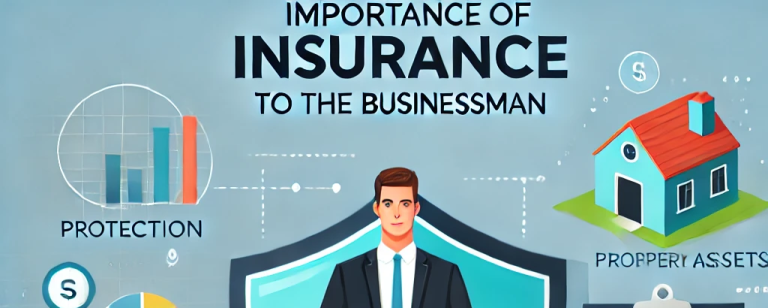In today\’s fast-paced and often unpredictable business landscape, companies face a wide array of risks. From natural disasters to employee injuries, from cyber-attacks to lawsuits, these risks can significantly impact a company\’s finances and reputation. The role of insurance in business is crucial, as it acts as a safeguard against such uncertainties. Whether you\’re a small business owner or managing a large corporation, having the right insurance coverage is key to ensuring the longevity and stability of your business.
This article will delve into the various types of insurance businesses should consider, why they are important, and how they can protect your assets, employees, and overall operations.
What is Business Insurance?
Business insurance is a broad category of insurance coverage that protects a business from financial loss due to various risks. These risks can range from damage to property and theft to legal liabilities and employee injuries. The insurance industry provides tailored policies to address specific business needs, ensuring that companies can recover from unforeseen events without facing crippling financial setbacks.
Types of Business Insurance
There are many types of insurance available to businesses, each serving a different purpose. Below are some of the most common types of business insurance:
1. General Liability Insurance
General liability insurance is one of the most fundamental types of business insurance. It protects businesses from third-party claims related to bodily injury, property damage, and advertising injury. For instance, if a customer slips and falls in your store or office, this type of insurance would cover the legal fees and medical expenses associated with the accident. It also covers damages from defamation or false advertising claims.
General liability insurance is essential for businesses of all sizes, as it provides basic protection against some of the most common legal and financial risks.
2. Property Insurance
Property insurance protects a business’s physical assets, such as buildings, equipment, inventory, and furniture. If your business suffers from a fire, theft, or natural disaster, property insurance helps cover the costs of repairing or replacing damaged items.
For businesses with a physical location, having property insurance is crucial. It ensures that your company can continue operating after an unexpected disaster, as it covers the cost of rebuilding or replacing essential property.
3. Workers\’ Compensation Insurance
Workers\’ compensation insurance is mandatory in most states and covers medical expenses, lost wages, and rehabilitation costs for employees who are injured while performing their job duties. This insurance also protects businesses from lawsuits related to workplace injuries.
As a business owner, offering workers\’ compensation ensures your employees are taken care of in case of injury, while also protecting your company from costly legal claims.
4. Professional Liability Insurance (Errors & Omissions Insurance)
Professional liability insurance, also known as errors and omissions (E&O) insurance, is especially important for service-based businesses. It protects companies against claims of negligence, mistakes, or failure to deliver services as promised. For example, if a client claims that your service caused them financial harm or damages, this insurance would cover legal defense costs and potential settlements.
Businesses that provide professional services, such as consultants, lawyers, architects, or accountants, should strongly consider this type of coverage.
5. Business Interruption Insurance
Business interruption insurance, also known as business income insurance, helps protect a business from income loss caused by disruptions in operations. This coverage can apply if your business is forced to close temporarily due to a covered event, such as a natural disaster, fire, or power outage.
For businesses that rely heavily on daily operations to generate income, business interruption insurance is a valuable safeguard. It ensures that you don’t lose revenue while waiting for repairs or until business operations can resume.
6. Cyber Liability Insurance
As more businesses move online and conduct digital transactions, the risk of cyber threats has grown significantly. Cyber liability insurance helps protect against losses caused by data breaches, hacking, and other cyberattacks. This insurance covers the costs of recovering data, notifying customers, and handling the legal and regulatory implications of a cyberattack.
For businesses that store sensitive customer information or conduct online transactions, cyber liability insurance is becoming increasingly essential.
7. Commercial Auto Insurance
Commercial auto insurance is necessary for businesses that own or operate vehicles as part of their operations. Whether it\’s a fleet of delivery trucks or a company car, commercial auto insurance protects against accidents, damage, or theft of business vehicles. It also covers liability for injuries caused by drivers in the course of doing business.
If your business involves transportation or the use of vehicles for work-related tasks, commercial auto insurance is a must-have.
Why is Business Insurance Important?
Now that we’ve discussed the different types of business insurance, let’s explore why this coverage is essential for your business:
1. Protects Your Assets
Whether it’s physical property, intellectual property, or financial assets, business insurance helps protect the things you’ve worked hard to build. With the right coverage, your company can bounce back quickly after a disaster or loss, reducing the risk of financial ruin.
In 2025, businesses face even more challenges from evolving risks, so it’s vital to ensure your assets are properly protected. Whether it\’s from a fire, theft, or a lawsuit, insurance provides a financial safety net for these situations.
2. Safeguards Your Employees
Employees are the backbone of any business, and ensuring their well-being should be a top priority. Workers\’ compensation insurance and other employee-related coverage protect employees in the event of injury or illness, ensuring they receive necessary medical treatment and financial support.
Moreover, providing health insurance or life insurance options can help attract and retain top talent, contributing to the overall success of your business.
3. Helps Avoid Legal and Financial Liability
In a world where lawsuits and claims are increasingly common, business insurance helps mitigate the financial and legal risks that come with operating a business. Whether you’re facing a product liability lawsuit or dealing with damages caused by a worker’s negligence, insurance ensures that your business is covered for the costs.
Without proper insurance, legal costs and settlements could cripple your business. Insurance acts as a buffer to absorb these unexpected costs.
4. Enhances Business Continuity
Accidents, disasters, and lawsuits are inevitable, but with insurance, they don’t have to result in a business closure. Business interruption insurance, for instance, allows you to keep your business afloat while dealing with the aftermath of a crisis.
This kind of insurance ensures that, even if a significant disruption occurs, your company can survive and eventually thrive again.
Conclusion
Insurance is an essential component of any successful business strategy. Whether you\’re a small startup or an established company, the right insurance policies can protect your assets, employees, and operations from the unpredictable nature of business risks. From property damage and employee injuries to cyberattacks and legal claims, insurance provides peace of mind and helps ensure the long-term viability of your business.
In 2025, as risks continue to evolve and new challenges arise, it’s more important than ever to have comprehensive coverage in place. Consult with an experienced insurance professional to assess your business’s specific needs and find the right policies to protect what matters most.
External Links for Further Reading:



